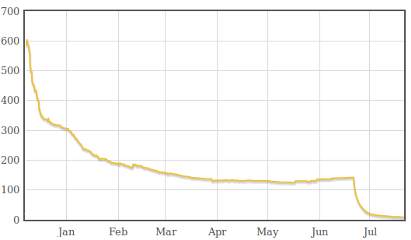Ubuntu Development Update
Loads of good stuff is happening in Ubuntu these days. You can get a good idea of it when you check out the oneiric-changes mailing list. Lots of these changes have been in the making for a bit longer, so expect the ground-breaking changes to happen in the next few weeks. If you’re after the big picture overview: the status overview should give you a very detailed look on how each feature is progressing.
It’s two weeks until Alpha 3 is going to be released and 3 weeks until Feature Freeze, when the majority of the feature work should have landed. If you have updates you want to get into Ubuntu which shake things up, you better get a move on and do it now.
Ubuntu is busy busy busy. On the events front, there was Ubuntu Developer Week last week: around 300 attendees, 25 sessions, all about getting you involved into Ubuntu Development. (Here’s a summary I wrote of the sessions that happened.) Until tomorrow Ubuntu Community Week is happening with great sessions that help you take your local Ubuntu team to the next level. Monday and Tuesday next week (25th-26th July) there will be Ubuntu Cloud Days. Next up will be Ubuntu Global Jam in early September. Awesome, you don’t just get bored in the Ubuntu world! 😀
If you want to get involved in packaging and bug fixing, there’s still a lot of bugs that need to get fixed, particularly packages that fail to build. Also is the Ubuntu Mozilla team looking for help, so if you’re excited about Mozilla and what’s happening there, join IRC, talk to the guys on #ubuntu-mozillateam on irc.freenode.net. And then there’s Security bugs you can take a look at, the team is a friendly bunch and they’re incredibly helpful in getting your patch reviewed.
Since last week we got quite a few new people in the Ubuntu Developer world. This time it’s four people who got their first changes into Ubuntu! Applause everyone! Gal Shalif, Kjetil Kjernsmo, Phil Hagelberg and Vincent Vinet. Good work everyone, rock on!
New Contributor
This week I talked to Alexander Fougner from Sweden, here’s what he has to say:
 About me:
About me:
I’ve been interesting in technology as long as I can remember and since my first programming class, I’ve been hooked on software development and computer science in general. This autumn, I’m about to begin my 3rd year studies at the IT programme at Uppsala University, Sweden.
My Linux/Ubuntu story
I had a few gaming consoles from M$ when those were popular (Yeah, those black ones you could put a modchip in). Basically, I had this desire for a server. Somewhere to put my files, hosting a website, all that stuff. Also, all the cool guys had one (or two). I found out one can run linux on the xbox, but when I first tried Xebian (Debian with a few tweaks for the xbox) i followed a tutorial and nothing i typed in that shell made any sense. I ditched all that magical stuff, until one day in school, when one of our teacher taught us some basic *nix commands (ls, cd, pwd) in a PC class. After that special day, my life changed.
When I bought my first own laptop, Debian had been running on my xbox for more than a year. After a few months I decided to try linux on my laptop. The distro? Have a guess!
Gutsy gibbon (7.10) was released just days before, so I installed it and I’ve used Ubuntu ever since, more or less. Well, I’ve had a dual-boot setup with Windows, but that’s another story.
How I got involved
Since I started out using Ubuntu, I’ve always wanted to give back to the community, to make it better. Recently I learned about Git in school, so it was easy to start using Bazaar as well. And thanks to Daniel Holbach’s handy packaging guide, all it takes to get involved is a few simple steps to setup the environment.
What my experience was like
It’s a wonderful feeling fixing a bug, even the simple ones. The workflow for a basic bug is very simple, however it will take me some time to get used to the process of submitting bugs and patches upstreams.
I shouldn’t repeat what everyone else says, but the community is such a friendly bunch! ‘nuff said.
Problems faced
A lot, of course, but mostly small ones. The good thing is, when you try to solve them, you learn something!
What do you think could have been easier?
- Packaging is from the medieval ages! At least that’s my feeling as a beginner. It’s hard to learn about all the rules and tools for the packaging, but hopefully that’s something you learn along the way.
- The whole “submit upstream” process. Every project has its own bug tracking system, rules, reviewboards, and only the advanced users know how to manage them all. Good thing they’re willing to help!
This week’s spotlight
When you get involved in Ubuntu development, you will be in a position where your patches will have to be reviewed first or where you need to get requests approved by another team first. In the past these things turned out to be bottlenecks. In the last few development cycles we started having a look at the problems. I’ll show you some graphs and you can judge by yourself.
Sponsoring
We call the process where a seasoned developer reviews a patch of a new contributors and uploads the changes to the Ubuntu build machines. As noted above this sometimes took quite a long time to get a reply, here’s how things have changed in the last few months.

Hours in queue
Yes, this shows hours an item was in the queue before it got sorted out. When we started last year this was up at an average 600 hours per item. Obviously there were a few patches and changes that were sitting there for a few months/weeks before somebody went and looked at them. We are doing much much much better.
If you know how to review code, simply follow our code review guidelines, go ahead and help out.
Get Involved
- Read the Introduction to Ubuntu Development. It’s a short article which will help you understand how Ubuntu is put together, how the infrastructure is used and how we interact with other projects.
- Follow the instructions in the Getting Set Up article. A few simple commands, a registration at Launchpad and you should have all the tools you need, and you’re ready to go.
- Check out our instructions for how to fix a bug in Ubuntu, they come with small examples that make it easier to visualise what exactly you need to do.
Find something to work on
Pick a bitesize bug. These are the bugs we think should be easy to fix. Another option is to help out in one of our initiatives.
In addition to that there are loads more opportunities over at Harvest.
Getting in touch
There are many different ways to contact Ubuntu developers and get your questions answered.
- Be interactive and reach us most immediately: talk to us in #ubuntu-motu on irc.freenode.net.
- Follow mailing lists and get involved in the discussions: ubuntu-devel-announce (announce only, low traffic), ubuntu-devel (high-level discussions), ubuntu-devel-discuss (fairly general developer discussions).
- Stay up to date and follow the ubuntudev account on Facebook, Identi.ca or Twitter.


